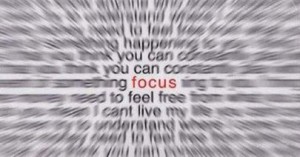In a world of multi-tasking and hand-held devices, our moments of laser focus are in danger of extinction. Instead of dedicating our full attention to one thing at a time, we live in a society that promotes the opposite. The idea seems to be that the busier we are, the more productive we’ll be. However, the critical question is, how do we continue to approach our tasks at hand during the busier times?

Too often I have found that whenever we come across a large amount of things to do, we tend to fall into a state of desperation, causing us to hit the panic button and scramble our attention. This is when multitasking comes into play. Instead of trying to swallow the elephant within one bite, we need to relax, take a step back and dissect this large, overwhelming task into small individual steps. Once we accomplish this, it is our responsibility to then focus our entire attention on that step, without thinking about the next step until the current one is completed.
READ ALSO: 11 life lessons
Consistency is another vital attribute when it comes to focus management. I believe that focus + consistency = tremendous gains and results. If we manage to set up a focus management plan but lack consistency, we will not get very far in whichever endeavor we pursue. This is one of the reasons why I believe it’s important to break down our tasks into small, individual ones. This gives us the opportunity to accomplish more as well as gain momentum. Once we begin to gain momentum, we will then begin to generate the energy needed in order to achieve consistent results.
This new style of working may sound a little bit awkward for those who are accustomed to multitasking, but I guarantee it is more productive than divvying up your attention. It’s all about making consistent and focused increments towards accomplishing your goals.
This is a guest post by Luis Rosario, the Director of Communications / Event Relations for MorningCoach.com Personal Development Community, an online community that focuses on prosperity & abundance, lifestyle design, quality of life, and motivation. With an educational background in Sociology and Inter-cultural Communications, his mission is to change the world for the better one event at a time!





